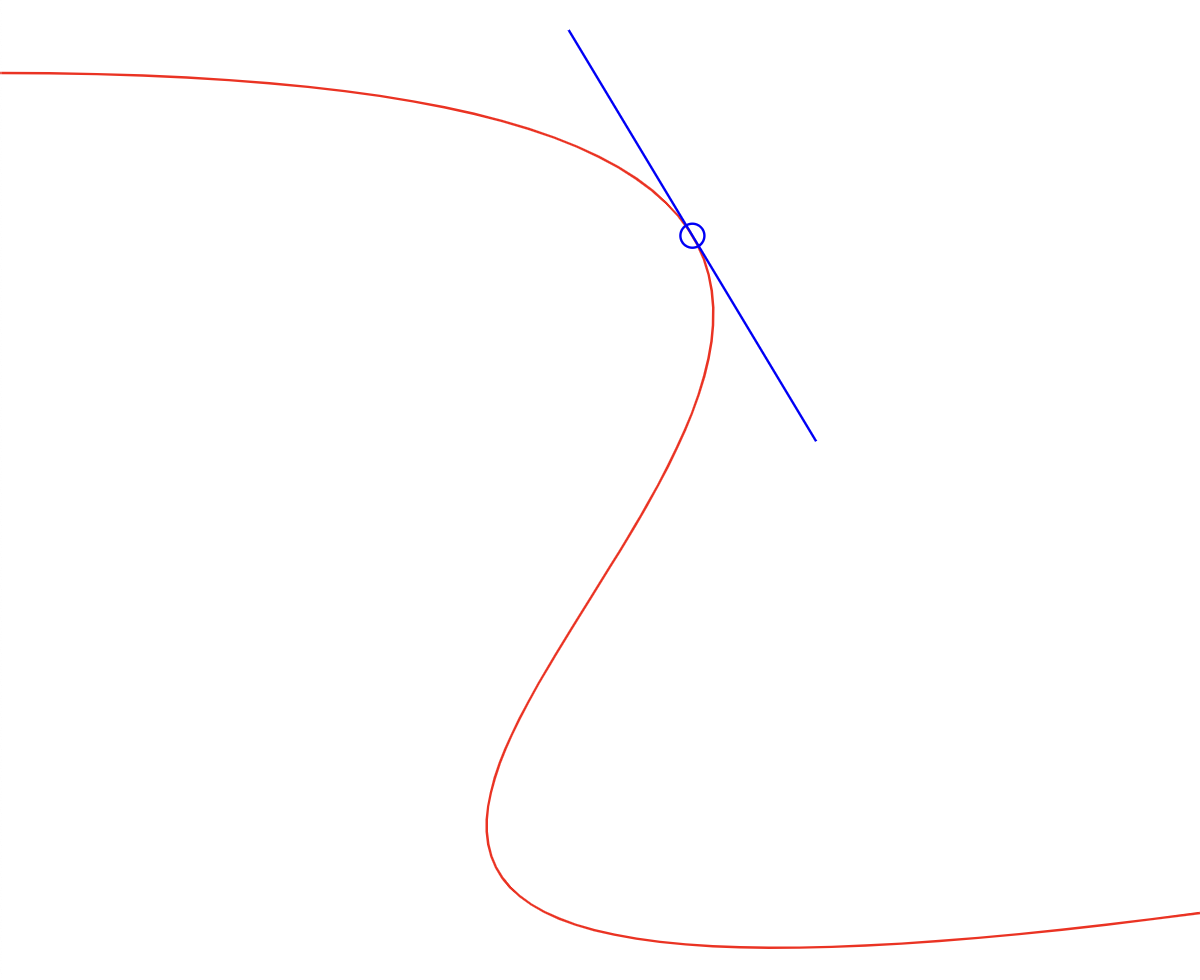This project is part of the @thi.ng/umbrella monorepo.
Multivariate dual number algebra, automatic differentiation.
(Package name with hat tip to @paniq)
Dual numbers are an elegant solution to compute precise(1) derivatives of functions which otherwise require complex & brittle numerical solutions. Furthermore, multivariate dual numbers can be used to obtain (in parallel) derivatives of multiple variables within a single function execution.
In this package, dual numbers are encoded as vanilla JS arrays with the internal
structure: [real, d1 .. dn], where real is the real-valued part of the
number and d1..dn multivariate derivatives. At minimum, at least d1
exists, but the number (of derivatives) depends on usage and the number of
variables in a function one wishes to compute derivatives for.
(1) Here "precise" within the realm of IEEE-754
Some examples (see further below for code example):
[Math.PI, 0] // the scalar π as 1-dual number
[Math.PI, 1] // π as the current value of a 1-dual variable
[5, 1, 0] // 5 as first variable in 2-variable function
[3, 0, 1] // 3 as second variable in a 2-var function
[5, 1, 0, 0] // 1st var in 3-var fn
[3, 0, 1, 0] // 2nd var in 3-var fn
[2, 0, 0, 1] // 3rd var in 3-var fnAlternatively, use convenience fns to create dual numbers:
$(5) // [5, 0]
$(5, 1) // [5, 1]
$2(5) // [5, 0, 0]
$2(5, 2) // [5, 0, 1]
$3(5) // [5, 0, 0, 0]
$3(5, 2) // [5, 0, 1, 0]
dual(5, 6) // [5, 0, 0, 0, 0, 0, 0]
dual(5, 6, 4) // [5, 0, 0, 0, 1, 0, 0]The following operations are available so far. Each operation takes one or more multivariate dual number(s) and computes the actual real-valued results as well as the 1st derivatives. Each op has an optimized/loop-free impl for 1-dual numbers.
add(a, b)sub(a, b)mul(a, b)div(a, b)neg(a)abs(a)
Exponentials:
pow(a, k)(k = scalar)sqrt(a)exp(a)log(a)
Trigonometry:
sin(a)cos(a)tan(a)atan(a)
Polynomials:
quadratic(x, a, b, c)⇒ ax^2 + bx + ccubic(x, a, b, c, d)⇒ ax^3 + bx^2 + cx + dquartic(x, a, b, c, d, e)⇒ ax^4 + bx^3 + cx^2 + dx + e
For each polynomial, there're scalar versions available too, taking only
rational numbers as arguments (rather than dual numbers already). These versions
are suffixed with S (for "scalar"): quadraticS, cubicS and quarticS...
ALPHA - bleeding edge / work-in-progress
Search or submit any issues for this package
- @thi.ng/math - Assorted common math functions & utilities
yarn add @thi.ng/dual-algebraES module import:
<script type="module" src="https://cdn.skypack.dev/@thi.ng/dual-algebra"></script>For NodeJS (v14.6+):
node --experimental-specifier-resolution=node --experimental-repl-await
> const dualAlgebra = await import("@thi.ng/dual-algebra");
Package sizes (gzipped, pre-treeshake): ESM: 1.00 KB
Several demos in this repo's /examples directory are using this package.
A selection:
| Screenshot | Description | Live demo | Source |
|---|---|---|---|
 |
Compute cubic spline position & tangent using Dual Numbers | Demo | Source |
import { $2, add, mul, neg, sin, evalFn2 } from "@thi.ng/dual-algebra";
// compute the actual result and derivatives of X & Y
// of this function with 2 variables:
// z = -x^2 + 3 * sin(y)
const f = (x: number, y: number) => {
// convert to multivariate dual numbers
const xx = $2(x, 1);
const yy = $2(y, 2);
// compute...
return add(neg(mul(xx, xx)), mul($2(3), sin(yy)));
}
// `evalFn2()` is higher order fn syntax sugar to simplify
// dealing w/ scalars, here same with that wrapper:
const g = evalFn2((x, y) => add(neg(mul(x, x)), mul($2(3), sin(y))));
f(0, 0);
// [0, 0, 3] => [f(x,y), dFdx(f(x,y)), dFdy(f(x,y))]
g(0, 0);
// [0, 0, 3]
f(1, Math.PI);
// [-0.9999999999999997, -2, -3]Polynomial example (see interactive graph of this function):
import { add, mul, pow, cubicS } from "@thi.ng/dual-algebra";
// compute the cubic polynomial: f(x) = 2x^3 - 3x^2 - 4x + 5
// using `cubicS()` polynomial helper
const f1 = (x: number) => cubicS(x, 2, -3, -4, 5);
// ...or expanded out
const f2 = (x: number) =>
add(
add(
add(
mul([2, 0], pow([x, 1], 3)),
mul([-3, 0], pow([x, 1], 2))
),
mul([-4, 0], [x, 1])
),
[5, 0]
);
f2(0) // [5, -4] [f(x), dFdx(f(x))]
f2(1) // [0, -4]
f2(2) // [1, 8]Karsten Schmidt
If this project contributes to an academic publication, please cite it as:
@misc{thing-dual-algebra,
title = "@thi.ng/dual-algebra",
author = "Karsten Schmidt",
note = "https://thi.ng/dual-algebra",
year = 2020
}© 2020 - 2021 Karsten Schmidt // Apache Software License 2.0